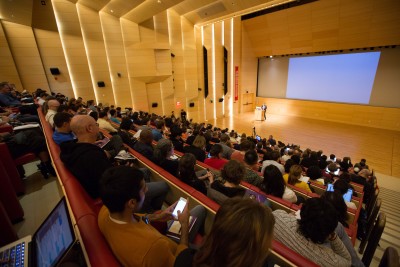There was a sensation of eagerness that could be felt in each room at the Platform Cooperativism Conference. The event, held at The New School on Nov. 13 and 14, had groups of people gathered on the floors of the University Center, juggling their laptops, iPhones and the heated conversations with their neighbors.
The “Platform Cooperativism” movement surfaced from New School faculty member Trebor Scholz. About a year ago, Scholz wrote Platform Cooperativism vs. the Sharing Economy.
He outlined how the sharing economy bubble, companies that operate like Uber or Airbnb, has popped due to the unfair treatment of its employees, disconnect between the benefits received by owners/investors and employee benefits and lack of regulations.
“There isn’t just one inevitable future of work,” Scholz wrote. “Let us apply the power of our technological imagination to practice forms of cooperation and collaboration. Worker-owned cooperatives could design their own apps-based platforms, fostering truly peer-to-peer ways of providing services.” And so, Platform Cooperativism was born.
In his Friday talk at the conference , Scholz asked, “How can you call something innovative and efficient if it prolongs structural inequality, classism and racism?”
Almost every room was overflowing with people, men in suits and women in “happy hacker” T-shirts sat in the aisles and many had their Tweetdecks armed and ready.
Each talk brought on the sensation of hope and collaboration, mixing together to produce tangible solutions where there was once only “academic fantasy,” as Scholz described.
There were over 20 different talks outlining ideas of design, infrastructure, “worker voice,” policy, unions, and development.

In a talk about design, audience and panel members bounced around ideas of design that unknowingly promoted sexism and how to remove this bias.
“What would a different kind of economy look like, in terms of what we value?” asked Omar Freilla, founder of Green Worker Cooperatives, during the Student Town Hall.
Each discussion focused around the main idea of changing the existing structure of the workforce by creating realistic alternatives through technology and cooperatives.
When asked what Scholz thought young people should be aware of moving forward, in terms of co-ops, he replied, “They are an option. When students leave college isn’t it the first thing to, platform or not, internet or not, find a collective solution to their problem which is employment? So why couldn’t they form a business, many Parsons students form businesses, for example, they hook up with each other and create these businesses, so why couldn’t they be worker owned co-operatives, and contribute towards this positive movement?”
After the last presentation of the weekend Scholz expressed his gratitude towards the success of the event and how many people it had congregated, “over 1,200.”
Those who missed the conference can watch the recorded live stream.







